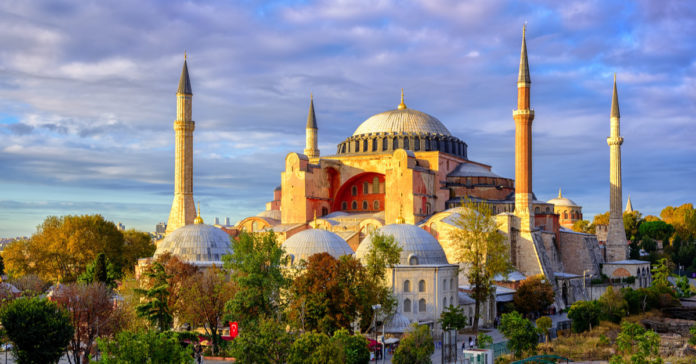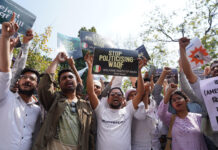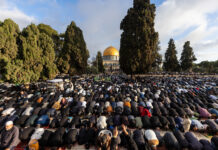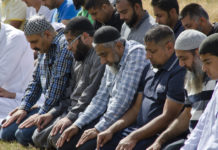From a Muslim perspective 2020 will probably go down in history as the year when the coronavirus pandemic forced the cancellation of the Hajj for foreign pilgrims, as well as the year when four Arab nations normalised ties with Israel.
ARAB NATIONS MAKE PEACE WITH ISRAEL
During the course of the year, four Arab nations – the UAE, Bahrain, Sudan and Morocco – normalised ties with Israel in deals brokered by the United States.
The United Arab Emirates and Bahrain committed to a “warm peace” with Tel Aviv, promising genuine people-to-people relations.
Sudan would soon follow in exchange for Western sanctions relief. And Morocco would gain U.S. recognition of its sovereignty over Western Sahara in exchange for normalising ties with Israel.
The Palestinians condemned all of these deals, calling them a “stab in the back” for their cause.
HAJJ CANCELLED FOR FOERIGN PILGRIMS
Subscribe to our newsletter and stay updated on the latest news and updates from around the Muslim world!
In May Saudi Arabia confirmed that no foreign pilgrims would be allowed to perform the Hajj in 2020.
Minister of Health, Dr Tawfiq Al-Rabiah, and Minister of Hajj and Umrah, Dr Muhammad Saleh Benten, said no more than 10,000 domestic pilgrims would be allowed to perform the Hajj under “strict health measures and protocols” to prevent coronavirus from spreading.
Saudi authorities went onto issue special health protocols for the Hajj, including that pilgrims must not touch or kiss the Holy Ka’aba and the Black Stone and that they must use sterilised pebbles for the stoning ritual.
The draconian measures were introduced as a result of the coronavirus pandemic with only limited amounts of people already residing in the kingdom allowed to perform Hajj.
HAGHIA SOPHIA RESTORED AS A MOSQUE
In June a Turkish court ruled the 1934 conversion of Hagia Sophia into a museum illegal, thus paving the way for it to be turned into a mosque.
Shortly after the ruling, President Erdogan signed a decree opening Istanbul’s most famous building for prayers and transferring the monument to the presidency of religious affairs.
The case had been brought by a Turkish NGO seeking an annulment of the decision to convert Hagia Sophia into a museum after being a mosque for nearly 500 years – a move backed by Turkey’s President Recep Tayyip Erdogan.
Hagia Sophia was first constructed as a church during the Christian Byzantine Empire but was converted into a mosque after the Ottoman conquest of Constantinople in 1453.
Turning it into a museum was a key reform of the post-Ottoman authorities under the modern republic’s secular founder Mustafa Kemal Ataturk.
THE AMERICANS ASSASSINATE IRAN’S TOP MILITARY LEADER
In January America assassinated a top Iranian general.
General Qassem Soleimani was a national hero in Iran and a symbol of Iran’s successful “forward defence policy.” This has involved decades of work cultivating, financing and arming allies in places such as Syria, Iraq, Lebanon, Afghanistan, Yemen and Palestine with the goal of spreading Iranian influence and fighting Iran’s enemies.
The Americans had a particular grudge against Soleimani because of the role he played in targeting American forces after the 2003 invasion of Iraq.
In response Iran conducted the first direct military strike on a U.S. army base since World War 2, and they did so without any response from the U.S.
But the U.S. made it clear that they would not leave the Middle East despite Iranian demands and a vote in the Iraqi Parliament.
SRI LANKA FORCIBLY CREMATES MUSLIM CORONAVIRIS VICTIMS
In April the Sri Lankan government issued a gazette notification making cremations mandatory for COVID-related deaths.
Muslim leaders claimed the gazette violated World Health Organisation recommendations which do not oppose burials. The WHO guidelines stipulate that victims can be “buried or cremated.”
Throughout the year the authorities burned scores of Muslim coronavirus victims, including the dead body of a 20 day old Muslim baby.
The cremation of baby Shaykh came days after Sri Lanka’s Supreme Court rejected petitions by members of the Muslim community against the government’s regulation that makes cremations mandatory for COVID-related deaths.
Twelve Muslim petitioners challenged the regulation, claiming it impinged on the fundamental rights of the island’s Muslim minority. But their pleas fell on deaf ears.
FRANCE SHUTS DOWN MUSLIM ORGANISATIONS
Following the beheading of a French schoolteacher over Charlie Hebdo’s blasphemous cartoons of the Prophet Muhammad (pbuh), the French government officially dissolved the nation’s main anti-Islamophobia organisation in November.
In his decree against the Collective against Islamophobia in France (CCIF), Interior Minister Gérald Darmanin accused the organisation of having “for several years… consistently conducted Islamist propaganda.”
The CCIF announced that its assets had “been transferred to partner associations which will take over the fight against Islamophobia on a European scale.”
Two other Islamic associations were also dissolved in October for similar reasons.
The charity BarakaCity was accused of “propagating ideas advocating radical Islam,” and the “Cheik Yassine” group was closed down after its President Abdelhakim Sefrioui was indicted in the attack on the schoolteacher.
BarakaCity officials and its founder Idriss Sihamedi have sought “political asylum” from Turkish President Recep Tayyip Erdogan.
Muslims around the world condemned France’s hypocrisy in upholding free speech when it offends Muslims, but denying it to Muslims who condemn France’s Islamophobia.
UNITED STATES AND TALIBAN SIGN PEACE DEAL TO END WAR
In February the United States and the Taliban signed a final peace deal in Qatar’s capital Doha to end the United States’s longest ever war, fought in Afghanistan since 2001.
The agreement paved the way for the U.S. to gradually withdraw its troops over 14 months.
The agreement had three points:
- A timeline of 14 months for the withdrawal of all U.S. and NATO troops from Afghanistan
- A Taliban guarantee that Afghan soil will not be used as a launchpad that would threaten the security of the U.S.
- The launch of intra-Afghan negotiations by March 10; and a permanent and comprehensive ceasefire
In a statement, the Taliban said: “The accord about the complete withdrawal of all foreign forces from Afghanistan and never intervening in its affairs in the future is undoubtedly a great achievement.”






















